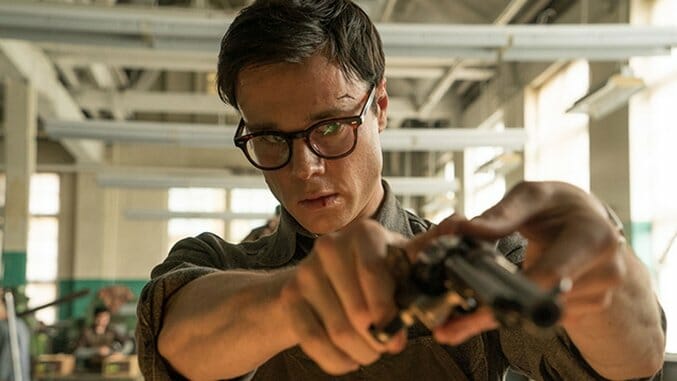Immediately following the blowing of a hole through the door of an abandoned warehouse in Canon City, The Marshal (Burn Gorman) follows up in episode four, titled “Revelations,” with a lot of what he did in episode three: stalking dark hallways, declaring vague koans to unimpressed strangers, and generally proving that in a show about the individual’s moral grey against an institutional system built on oppression, there’s always room for one person who’s just totally evil. Carrying on from the last seconds of “The Illustrated Woman,” The Man in the High Castle continues with Juliana Crain (Alexa Davalos) in yet more peril, chased by The Marshal through any number of slasher movie tropes. The aforementioned “revelations” in the episode’s title abound, though none are particularly revelatory, promising little fascination past Juliana learning that hunkalicious American hero Joe (Luke Kleintrank) also has a copy of The Grasshopper Lies Heavy and is maybe a Nazi.
The series continues on the middle-of-the-road trajectory launched in previous episodes, where everything happens pretty much as one would expect it to. After not killing The Marshal for whatever idiotic idea—except possibly to emphasize the gravity of the conversation Joe and Juliana had last episode about how killing can sometimes be something one “must do”—they seek out the owner of the Sunrise Diner (and Juliana’s former boss for all of the six hours she was employed), Lemuel Washington (Rick Worthy). Lem, apparently, is a member of the Resistance, and Juliana’s original intended contact in Canon City (revelations!), while the man who made paper animals worked for the Reich, which is why he attacked Juliana, which is why he knew she had the film, and so on. Lem agrees to take the two to the Man in the High Castle, so that Juliana can hand over the film herself. Of course, no one knows what the Man in the High Castle is going to do with the films, nor where the films came from—everyone is just keeping their heads down and doing their “part”s in this post-apocalyptic past.
In San Francisco, Frank (Rufus Sewell) pays a visit to an Americana antiques dealer to buy bullets for his handmade Colt .45, even though said bullets (and said gun) are totally illegal under the laws of the Pacific States. Nothing that 600 yen won’t take care of, even though the nervous shop owner demands Frank’s information should the matter come back to bite him (which it will, I’m sure). Frank’s not worried, because Frank is planning to assassinate the Japanese prince, who, unbeknownst to lowly factory worker Frank, is actually (more revelations!) a thoughtful person who only wants “peace” in the states—which of course is a different idea from the Nazi’s grasp of “peace,” which is more “world domination and assimilation” than actual “peace.”
Unbeknownst to both lowly factory worker Frank and the Japanese prince is that Trade Minister Tagomi (the expertly nervous Cary-Hiroyuki Tagawa) and his “Swedish friend” Rudolph Wegener (Carsten Norgaard) are concocting a scheme in which, during the prince’s public address in San Francisco, Wegener will slip an envelope containing a teensy incriminating microfilm into the pocket of another Japanese minister. This of course is the same event during which Frank plans to shoot the prince in order to satiate the vendetta he feels towards the Kempeitai for killing his sister, niece, and nephew, an inconsistency in logic pointed out by Frank’s friend Ed (DJ Qualls). I haven’t talked much about Ed in any of these episode reviews because he is one more boring character in a show full of boring characters—only he’s extra grating because he’s such a one-note nice guy he can only serve as a vessel for certain plot points.
In this episode that means that it’s Ed who picks up the phone when Juliana calls her boyfriend from Canon City, and he’s all, “Oh golly gee, Juliana, but Frank’s about to go do a bad thing! Aw shucks!” With that, Juliana’s convinced she needs to return to San Francisco, having just offloaded the film to Lem and his Resistance buds. She’s also none too pleased with dream-bro Joe, having learned that not only did he have a copy of The Grasshopper Lies Heavy of his own (revelations!), he’s also a Nazi double agent (so many revelations!). On top of which, all this info came to light on her botched journey to meet the Man in the High Castle, where instead of taking Juliana and Joe to the Man, Lem just wandered them out to the woods, held them at gunpoint, took their film canisters, listened to Joe desperately explain why he’s been a double agent all along, and then left them to see if they could find their way back to town.
It’s no surprise that Joe is falling for Juliana, harboring second thoughts about his allegiance (or not?) to Obergruppenführer Smith and the Reich, so when he actually starts to act on those conflicted feelings—saving her from The Marshal, say, or handing over the film to the Resistance when he was supposed to be on a mission to kill the Man in the High Castle—one wonders if we’re supposed to feel sympathy toward the guy, and not just impatience.
Yet, for all of the obvious rigmarole, the episode ends breathlessly, and for the first time in four episodes, The Man in the High Castle seems to be going somewhere unexpected—somewhere exciting. There is promise in these last moments, as the Trade Minister’s plan begins to unravel and Frank’s fate seems suddenly uncertain, promise that the show may be slowly climbing into its skin, ready to be the great series everyone hopes it can be.
Dom Sinacola is Assistant Movies Editor at Paste and a Portland-based writer. Since he grew up in the Detroit area, it is required by law that his favorite movie is Robocop. You can follow him on Twitter.
